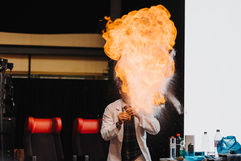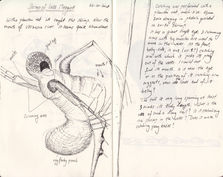thoughts & experiments
ressources
The Science Lab teaching method
A practical guide how to teach science more effectively
Teaching sciences (STEM) sounds complicated. How can biology, chemistry or physics be taught in a clear and understandable way? This document free of charge shows teachers within ten pages how they can quickly become successful science educators and make lessons entertaining and exciting.
about me

My younger self during a class on brine shrimp in Tasmania, Australia, in 2014.
I originally studied environmental sciences and journalism. Combining the two topics I became a science journalist. Over the past twenty years, I have written extensively for newspapers and magazines about glowing mushrooms, space missions and moles that shrink their brains. At some point, I began writing non-fiction for children. First books, then teaching materials and finally I produced entire science shows. Today, I am a science teacher for primary and secondary school. Science is important for society. Because it is not primarily about learning the periodic table by heart, but rather about learning how to think about the world and how to use thinking to acquire new knowledge. In every lesson, I ask questions that neither my students nor I can answer. That's good. Because it means we have to think about the question. Here, I try to pass on my experiences and some of the ideas I have developed over the years to other interested teachers.
impressions
testimonial
Dear Mr Bieri
I thought it was cool the way you came to visit us. Thank you, I thought it was a cool start to the day. I liked it so much. However, I thought it was a bit gross. For example, when you showed us the bacteria from your nose or your thumb. The horse poo didn't smell too bad. To be honest, it smelled quite a bit like hay. I thought the day you spent with us was cool, exciting, interesting, disgusting, impressive and crass.
Kind regards, Alena (9 years)





















